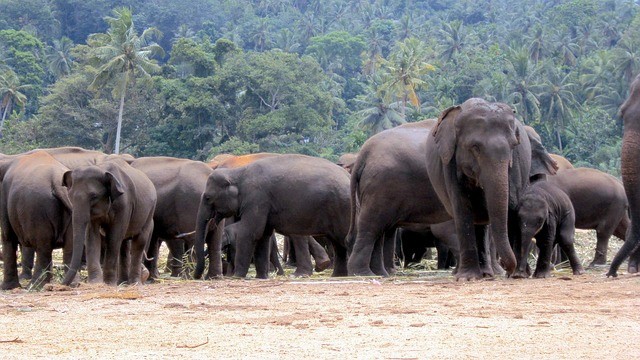
The one thing experts agree on about the migration of the wandering pachyderms from their nature reserve is that they are not on a random journey. The travel of 15 elephants across China has attracted social media attention. It also caused considerable damage to crops and caused over a million dollars damage throughout their migration, reported CNET via MSN.
The herd comprises six female adults, three male adults, three sub-adults, and three calves, as seen in surveillance photographs.
According to elephant expert Ahimsa Campos-Arceiz, a principal investigator at the Xishuangbanna Tropical Botanical Garden in an interview with the New York Times, the movement of the herd is unusual because they should have stopped traveling by this time.
Social media is abuzz with the wandering animals' antics as they march onwards across China. Residents in one town left corn stalks for food and trended the hashtag "northbound wild elephants' buffet site" on Weibo.
One social media user tweeted a joke that the elephants wanted to speak with the manager.
Wild animals as big as elephants are bound to displease someone
However, the elephants do more than just delight. According to the Chinese news agency Xinhua, which was cited by CNN, the animals caused 412 different instances of damage totaling $1.1 million (£779,894, AU$1.4 million). Although, no people have been hurt by the wandering pachyderms.
The herd was spotted last Tuesday evening about 3 kilometers from Kunming, nearly 500 kilometers (300 miles) into their mission, bringing attention to attempts to keep them out of populated areas.
Chinese wildlife authorities are trying to find the reason why the large mammals abandoned their natural habitat a year ago. However, they do not have any answers yet.
Xinhua said the herd of 16 wild elephants began traveling last March 2020. Although the elephant herd is traveling in China, it seems to have no definite destination, it did make some identified stops.
The elephants arrived in Pu'er, Yunnan last November and remained for five months when a female elephant gave birth to a calf. On April 16, they began their march again. Two of the animals left a week later, leaving 15 to continue their northbound journey.
The traveling elephant herd leaves damage in their wake
Residents of Yunnan were not happy because the animals caused trouble in the province, consuming entire acres of maize and destroying barns.
Six visiting elephants reportedly drank two tons of water in a car dealer's business located in Eshan county a week ago. It was also mentioned in the report that damage was estimated to be at least 6.8m yuan ($1.07m).
Other instances of elephants straying into towns and harming crops were previously reported, according to Chinese experts.
One explanation by Zhang Li, an expert on mammal conservation based in the Beijing Normal University, is human encroachment on natural habitats. He remarked that since humans are expanding their use of land, the buffer zones between human and elephant territory are getting smaller. Encounters with elephant herds have become inevitable.
Last week, the Yunnan Provincial Forestry and Grassland Administration told state media that it attempted to stop the herd from moving northwards and drive the elephants back to their intended sanctuary. However, it proved to be a difficult task. This elephant herd is traveling in China, but they need to go home to the reserve.








